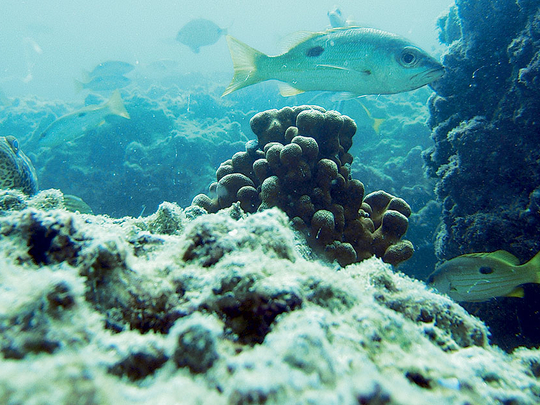
Abu Dhabi: When seawater temperatures reach 31 degrees Celsius, coral reefs the world over are unable to survive and begin to die off.
Yet in the UAE coastal waters, where temperatures routinely top 35 degrees, coral reefs continue to thrive and survive, making them one of the hardiest marine life forms on the planet, experts say.
As a result, many scientists are taking a renewed interest in studying the coral reefs of the region in order to gain a better understanding of how climate change could affect coral reefs and their ecosystem.
Gulf reefs’ hardiness could help future coral reef systems someday survive a warmer planet.
“We have coral reefs that are surviving here in temperatures that hit 35-plus-degrees every single year, and so as a result of these extreme temperatures, to me and the people who work in my lab this represents an ideal model ecosystem in which to study how climate change may affect reefs in other regions in the future, in terms of what types of species tend to win and tend to lose”, says John Burt, Associate Professor in Biology at New York University Abu Dhabi (Nyuad).
Professor Burt tells Gulf News how Abu Dhabi’s coral reefs are very unique in comparison to others, with no other examples of coral reefs being able to survive in the temperature range characteristic of Abu Dhabi’s waters.
“Throughout the tropics, particularly the low-latitude tropics like around the equator, those coral would guaranteed be dead, the vast majority of the Great Barrier Reef, most of the Caribbean, most of the tropical islands — like in the Indo-Pacific — all the coral would be dead if you took them at 35 degrees and left them there for a couple of weeks similar to the situation of the Abu Dhabi corals. So the Abu Dhabi corals are very unique to the region, and it’s unique globally for corals to survive at this temperature.”
The next step, according to Professor Burt, is learning how exactly Abu Dhabi’s corals manage to survive and adapt in such temperatures, and how the scientific research of what they have already learned may be used in helping preserve corals in other regions affected by rising water temperatures due to climate change.
“We are studying and trying to understand the mechanisms behind this, what makes these corals tick, and our Abu Dhabi-based research team is studying this very question, they dive on these reefs regularly and they are studying what adaptations have occurred in these corals that allow them to survive in this area.”
One idea put forward is called assisted migration, which is relocating corals from one region to another, as Professor Burt explains.
“Basically through human intervention you’re moving or relocating corals to other parts of the world as a potential stop gap for climate change, so if we have these thermally tolerant corals here in Abu Dhabi, could they be relocated let’s say to the Great Barrier Reef and allow them to colonise that area and increase the thermo-tolerance of the reefs in that area, and this idea has been gathering great attention in the scientific community.”
“We’ve done this in closed systems, we’re not talking about relocating them at this point, we’re just talking about could it work, so from a theoretical perspective is it possible to do this. We’re doing this in aquarium systems right now to show whether or not it’s a sustainable practice and the further discussion would have to go on with government agencies,” he adds.
Another idea being put forward and researched by the Abu Dhabi research team is to crossbreed between the Abu Dhabi corals and corals found in other parts of the world, to genetically mix the two together rather than having to relocate the corals.
“Rather than relocating whole corals what we could look at is the possibility of either relocation of larvaes or more to the point, doing crossbreeding by taking sperm from corals in the gulf or eggs from corals from the gulf and crossing them with colonies that are from the Great Barrier Reef or from the Caribbean. So crossbreeding programmes are being looked at as a way to increase the genetic capacity for corals to be thermo-tolerant, this project though is still only a year old, so there are still a lot of technical issues being worked out, but there has been some success so far in terms of the breeding efforts.”
— Sami Zaatari is a trainee at Gulf News












